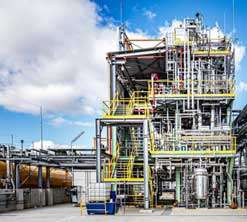 French tyre maker Michelin, research agency IFPEN and clean technology firm Axens have inaugurated what they say is the first industrial-scale demonstrator of a plant producing bio-based butadiene in France, at Michelin’s site in Bassens near Bordeaux. The demo unit was built within the framework of the BioButterfly project, involving the three partners, and supported by ADEME (French Agency for Environment and Energy Management) with the aim of developing and commercialising butadiene from ethanol derived from biomass (plants), to replace butadiene from petrochemicals.
French tyre maker Michelin, research agency IFPEN and clean technology firm Axens have inaugurated what they say is the first industrial-scale demonstrator of a plant producing bio-based butadiene in France, at Michelin’s site in Bassens near Bordeaux. The demo unit was built within the framework of the BioButterfly project, involving the three partners, and supported by ADEME (French Agency for Environment and Energy Management) with the aim of developing and commercialising butadiene from ethanol derived from biomass (plants), to replace butadiene from petrochemicals.
BioButterfly has reached a significant step in creating a bio-based synthetic elastomer industry.
Butadiene, a C4 diolefin, is an important chemical intermediate in the production of numerous polymers used for many applications: 40% of butadiene is used to produce elastomers for the tyre market. The other 60% is primarily used to produce varnish, resin, ABS plastic, nylon for automobile applications, textiles and in construction. These applications offer additional potential markets for bio-based butadiene.
After launching in July 2023, the industrial-scale demonstrator must validate each stage in the manufacturing process of bio-based butadiene. In this way it is proving its technological and economic viability, with a production capacity of between 20 and 30 tonnes/year – a scale which will enable rapid industrial development.
This demonstration stage is providing a pathway to global commercialisation of this new process – which will enable the production of innovative synthetic rubbers, without fossil-based resources – and the development of a new bio-based butadiene sector.
Axens adds that its commercialisation of this technology will be a crucial step in ensuring significant volumes of renewable butadiene.
Michelin adds it is working with its partners to build new, virtuous ecosystems and to develop synergy between various players in the value chain to operate, finance and boost the production of renewable butadiene. Over time, these ecosystems will bring about the construction of several plants worldwide to meet growing demand for sustainable and bio-based finished goods.
To date, the BioButterfly project represents a total investment of more than EUR80 million (of which EUR14.7 million of support by ADEME (French Agency for Environment and Energy Management) under the Investments for the Future Program).
The project also received support from the Nouvelle Aquitaine region and the Bordeaux Urban Community. It has so far created around twenty jobs at Michelin’s site in Bassens.
